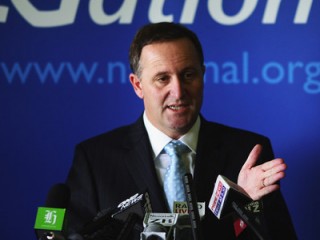
John Key biography
Date of birth : 1961-08-09
Date of death : -
Birthplace : Auckland, New Zealand
Nationality : New-Zeelander
Category : Politics
Last modified : 2010-07-22
Credited as : Political leader, Prime minister of New Zeeland, businessperson
1 votes so far
New Zealand's Nationalist Party leader John Key became the country's prime minister in November of 2008. A successful investment banker who did not begin his political career until 2002, Key's comparative lack of experience was viewed by many New Zealanders as a breath of fresh air. His inspiring "rags-to-riches" story also resonated with the electorate. How Key would fare in tackling the country's top job, however, remained to be seen.
Rags to Riches
Key's late mother, Ruth, fled her native Austria for England in 1938 in the face of the escalating persecution of Jewish people and the onset of World War II. Ten years later, she met and then married Englishman George Key, with whom she immigrated to New Zealand. Their son John was born in Auckland in 1961. Misfortune struck in the late 1960s, when Key's father died, leaving the family in debt. Key's mother worked nights to support him and his two sisters, and her diligence and sacrifice were not lost on him. "There was a lot of love in my family, but not necessarily a lot of money," Key told Anne Barrowclough of the London Times. "My mother taught me the value of things."
Despite his challenging childhood, Key excelled in life. After graduating from Christchurch's Burnside High School in 1978, he earned a bachelor of commerce in accounting from Canterbury University (1981). He then embarked upon an extremely successful career that would eventually make him a very wealthy man. Key started out as a project manager at Lane Walker Rudkin in Christchurch before taking a job as a currency trader with Elders Merchant Finance in Wellington in 1985. He rose to become head trader there, and then signed on as chief of foreign exchange at Bankers Trust in Auckland in 1988. In 1995, he left New Zealand to join investment banking behemoth Merrill Lynch, working in Singapore, London, and Sydney in a variety of key positions. He was also a member of the Foreign Exchange Committee of the Federal Reserve Bank of New York. By 2001 however, Key had amassed a sufficient fortune to allow him to return to his homeland and pursue a longtime dream to enter politics.
48th Prime Minister of New Zealand
After settling into a mansion in Auckland with his wife, Bronagh, and two children, Key turned his attention to politics. He was first elected a member of parliament for the National Party in 2002. He soon displayed a knack for his new profession that rivaled that of his previous one. In 2003, for instance, he became the party's deputy finance spokesperson, and its finance spokesperson the following year. Then, on November 27, 2006, just four years after joining the political fray, Key was elected leader of the National Party.
As Key progressed through his party ranks, he acquired a reputation for pragmatism and approachability. Some still considered him untested, and that became an important issue in the 2008 national elections. New Zealanders though, widely saw his relative lack of political experience as a bonus -- one that augured a refreshing change. Voters also appreciated Key's inspirational life story -- from humble beginnings to multimillionaire. For these reasons and others, the citizens of New Zealand elected Key their prime minister in November of 2008. The manner in which he would fulfill his new role was yet unknown, of course, but it was undeniable that Key had more than a little tendency to create success.
















